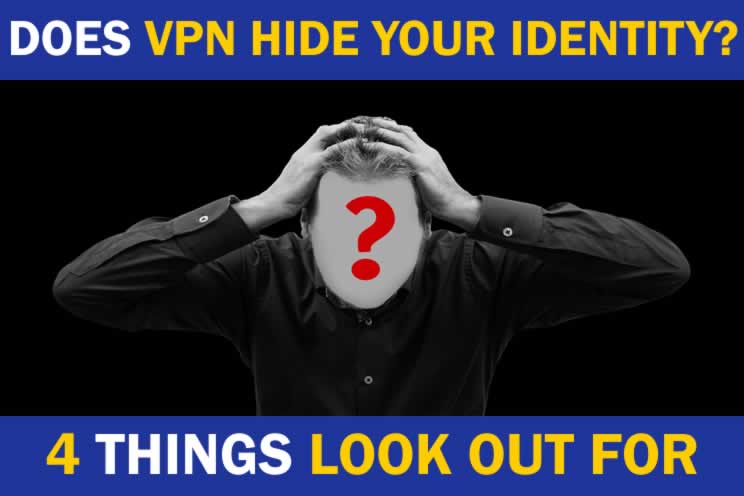
Anonymity on the internet has become a frequent desire of many since the rise of hackers and scams. Many of today’s internet users want to be as protected as possible to not become another hacking or identity theft statistic. Virtual Private Network (VPN) promises to help provide that anonymity to many users.
But, does VPN really hide your identity? VPNs are meant to hide your web browsing history, so Internet service providers (ISP) and the government can’t use it for tracking or advertising purposes. It also protects your personal information from being accessed by hackers and other dangerous individuals. VPNs are safer than browsing the web on a public platform or website.
This article will go into detail on what VPNs do and safety tips to look out for while browsing the web and how it can be sharing your personal information – whether you provided permission or not (check out my list of reputable VPNs here).
Your Search History
Using a VPN will hide your IP address[1]. This is important because the ISP and the government use your searches for tracking and ad purposes. Using a VPN can prevent them from accessing that information. This can be beneficial for those searches that you’d like to make, but don’t want a million ads to show you afterward on social media.
Clearing[1] your public searches will not get rid of them completely. The information is still present in your browsing history, cookies, and cached data. You can erase these in settings. However, your operating system won’t erase the data permanently. A VPN does not track or keep this data, so searching through this option will protect you more than searching through a public network.
VPNs will block third party users from gaining access to your search history.
A VPN will protect your information by making sure that third party users will not be able to access anything you search. This is important because many third-party groups, like the ISP, do not need your permission before sharing your information with advertisers.VPNs will encrypt[1] your IP address. This encryption is what protects you from being tracked while searching on the internet. This can prevent not only ISPs but hackers from knowing what you are searching for and sell it to ad companies. It also prevents multiple searches from being tracked during a longer browsing session.
Your Location
Many websites and search engines ask for your location. This is mainly for the browser to show you more relevant searches and local areas around you, but this information can also be leaked. This can be dangerous, depending on what you are searching for and who may have access to your public domain. A VPN will prevent this from being an issue.
Hackers will not ask for your location but can access it anytime you’re in a public domain. This can be especially dangerous if the hacker is doing so to find your location to get in touch with you. Whether it’s because they want to steal your information, identity, or possibly even harm you. It is important to stay safe and private on the internet.
Ad campaigns can send more junk mail to you by getting your location. While this is less dangerous than the previous section, it is still tiresome and unwanted attention. Once local areas have your address, they can start sending offers and ads in the mail to you, hoping for your business. This can be why you get a lot of ads in the mail and have no idea how they got your address.
Your address can be sold and shared with multiple people. This is true for ad companies and the ISP. Your address can be used to send ads as well as open up accounts or credit cards if they have other personal information on you. If your government controls[2] what you can and can’t search, this is also a way around that since your location is hidden.
Your Personal Information
Any time you put in your personal information on a public browser, subjects it to access[2] from other companies and individuals. This can include important items like your Social Security number or credit card information. Anyone who seeks this information can have it if they get access to your internet history and saved information. This is how many people get their identity stolen, and money is taken out or moved from their accounts.
Passwords can also be accessed or changed without your knowledge. Saving your passwords on internet browsers help save time and energy in remembering it but can also make it easier for others to gain access to your accounts. Whether they are social media or bank accounts, both can be harmful if accessed by someone else. They can also change your password and deny you access while they can do what they please.
Long gone are the days of the email scams. Now scammers are getting direct access to your personal information instead of sending emails asking for money to help out a “prince” in a faraway country. They have evolved with the internet and are finding less direct ways of accessing your personal information, which is why using a VPN is so important.
You do not need to give away your actual information if you use public domains. Many people make the mistake of using their real names and information while on the internet. You don’t necessarily have to do that. You can use an alias or nickname to hide your true identity from thieves or criminals who may take advantage of or harm you.
Your Safety
There are dangerous people in the world who can access you easier than ever, thanks to the internet. Many criminals preyed on those in their immediate environment, but now the internet has extended their reach.
This makes finding new victims ten times easier than in the past, which means we have to be cautious while searching the web – as well as while interacting on it with others. Many can do a lot of harm, with only a bit of personal information.
A phone number can be enough for a criminal to find your address. Criminals can use bits and pieces of information they get from you or from hacking your public browsers. Even a phone number is enough to figure out your location and any accounts linked to that location. So, be wary of any websites or people asking for that kind of information or use a VPN where the browser will not let others access it and use it against you.
Personal information can be used to commit serious crimes against the victim.
This study found people from all over the globe who were harmed in the past due to their information being taken or sold to criminals. One woman even said she was kidnapped by online criminals and sent to another country. She now uses a VPN to keep her identity hidden so she won’t become a victim ever again. Your online protection is a very important step toward your physical and emotional security, as well.
Last Words About Security
We’ve discussed reasons why VPNs can help hide your identity as well as what things you should look out for when browsing the web. VPNs can help promote anonymity on the internet so you can protect your identity and vital information from being leaked or sold to others. This can protect you as well as keep advertisers and the government out of your search history.
Sources:
[1] https://us.norton.com/internetsecurity-privacy-how-a-vpn-can-help-hide-your-search-history.html
[2] https://www.iplocation.net/use-vpn-hide-identity

